Saint Barnabas on the Desert
Saint Barnabas on the Desert is an Episcopal church located in Paradise Valley, Arizona. Founded as a mission church in 1953, the church was granted parish status in 1955, and was incorporated in 1958. The church moved into its present structure in 1961.
| Saint Barnabas on the Desert | |
|---|---|
| The Episcopal Parish of Saint Barnabas on the Desert | |
 Saint Barnabas on the Desert | |
| 33°19′26″N 111°33′37″W | |
| Location | 6715 N Mockingbird Lane Paradise Valley, Arizona |
| Country | United States |
| Denomination | Episcopalian |
| Website | saintbarnabas |
| History | |
| Founded | 1953, First service held on March 3, 1954 |
| Dedicated | November 12, 1961 |
| Consecrated | February 1, 1973 |
| Architecture | |
| Architect(s) | T.S. Montgomery 1960-64
Craig Walling 1988 Knoell & Quidort 2006-10 |
| Style | Mediterranean contemporary |
| Years built | 1961 Sanctuary, chapel, education building, offices, 1964 Hutton hall, 1976 Memorial Garden, 1988 Learning Center, 1999 Sean's Place, 2006 Music Center, Bookstore, Other Cup |
| Groundbreaking | 1960 |
| Completed | September 10, 1961 (contractor = Redden Construction (1961)) |
| Administration | |
| Metropolis | Phoenix |
| Diocese | Arizona |
| Clergy | |
| Bishop(s) | Jennifer Reddall |
| Rector | Jim Clark |
| Vicar(s) | Erica Von Haaren |
| Assistant priest(s) | Elizabeth Roles Robert Berra |
| Archdeacon | Sarah Getts |
| Deacon(s) | Susie Parker Tara Bartholomew Pam Bell |
| Laity | |
| Youth ministry coordinator | Kate Fimbres Sarah Peterson |
History
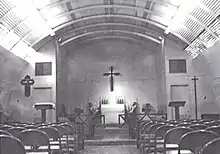
The parish was founded as a mission church in 1953, with its first service being held on November 15, 1953.[1][2] Initial services were held in various locations on private properties, until moved to a Quonset hut located at 132 W. Main Street in Scottsdale, which was consecrated on October 3, 1954.[3][4] Paul L. West was named as the parish's first rector in 1954, and St. Barnabas held its first service on March 3, 1954, which was Ash Wednesday.[2] By the end of 1954 the mission church was financially self-sufficient.[5] On January 4, 1955, Mr. & Mrs. Fowler McCormick donated the land on Mockingbird Lane in Paradise Valley where the current structure is located, very close to the property they would later donate to the city of Scottsdale for the McCormick-Stillman Railroad Park.[2] The ten acre parcel sat across the street from the Judson School.[6]
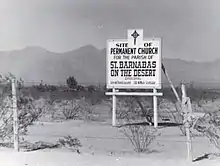
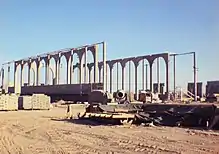
While continuing to conduct services in the Main Street location, the parish began raising funds for a permanent structure to be built on the donated property. Part of the Arizona Missionary Jurisdiction, the church was granted parish status by Bishop Arthur Barksdale Kinsolving II on November 1, 1955 (All Saints Day). On May 2, 1958, the church was officially incorporated in the state of Arizona. Later that year, the Missionary District officially became a Diocese of the Episcopal Church.[2] In September 1959 Henry B. Getz became the rector of the parish.[7] In 1959, the design and construction of the new church building was awarded to T.S. Montgomery.[2] In September 1960 it was announced that the parish had accepted the conceptual drawings for the church complex to be built on their 10-acre parcel. The design included four buildings. A 460-seat main sanctuary, a 60-seat chapel, and offices would occupy the main building; a meeting hall with kitchen facilities would be a second building, with the remaining two buildings named Education Buildings A & B housing classroom and small meeting rooms. The estimated cost of construction was $456,950.[6] Construction on the current sanctuary, along with the chapel, offices and education building B began in 1960, with the official ground breaking occurring on December 4.[8] It was undertaken by the Redden Construction Company of Phoenix. Construction was completed the following year and the first service in the present sanctuary was held on September 11, 1961. On November 12, 1961 all the new buildings were dedicated.[2][9] The sanctuary was "originally designed to have the acoustic properties of larger cathedrals".[10] 1961 also saw the creation of the Church's "Memorial Acceptance and Fine Arts" committee (MAFA). Composed of between seven and nine congregation members with fine arts interests, the committee is responsible for approving all religious items, artwork, and decorations for the church. The first work commissioned and completed was a baptismal font, designed by Paradise Valley artists, Allen Ditson and Lee Porzio.[11][12]
When the church installed its new organ in 1962, the notable American organist, Richard Purvis, flew into Scottsdale to perform the dedication ceremony.[13] The parish hall, now called Hutton Hall, was added to the church's campus in 1964, the fallowing year John H. Parke became rector.[14]
In November 1970, William Purdis Rowland was installed as the parish's new rector.[15] In 1973, in honor of the congregation paying off the original mortgage, a mortgage burning ceremony was held. The church was consecrated, and blessed by several Episcopalian dignitaries, including George R. Selway, Robert Donohoe (the ecumenical director of the Episcopal Diocese of Arizona), and the former pastor of St. Barnabas, Henry B. Getz. The consecration took place because a church in the Episcopal faith may not be consecrated until it is debt-free ("all possibility of alienation to secular uses be erased").[14] The sanctuary received new main doors which involved a new art form invented by Ditson and Porzio, called "traforato". The doors are cut forms of steel depicting scenes of children in the Bible, as well as the different stages of childhood. The cut steel is encased in glass. Some of the scenes depicted include David and Goliath and Tobias. Also seen in the artwork include images of musical instruments, natural objects and animals.[16] In addition to the doors, Ditson and Porzio created many other pieces of artwork for the church. Among these include a massive tapestry entitled, "Ode to Joy," designed by Porzio; the main altar and cross, acolyte chairs, candelabra, and various basins and stands.[17] 1976 saw the completion of the parish's memorial garden, located to the north of the main sanctuary; the garden had its first interment in February of that year. The second education building, the learning center, located to the east of the initial education structure and to the north of the memorial garden, was erected in 1988; the last of the three education buildings, named "Sean's Place", was built in 1999, located just to the east of the learning center.
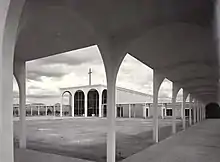
In 2006 the parish underwent a building expansion which saw the addition of a music center, a bookstore and lounge, and renovation of the existing parish hall. The music center includes a tower containing a 25-bell carillon,[18][19] designed by Royal Eijsbouts.[20][21] The carillon is the only carillon in the state of Arizona, and only one of approximately 200 in all of the United States. The bells were dedicated in a special concert on October 7, 2006.[22] The set consists of 25 bells, weighing 4,074 pounds, and are played electronically every hour from 9 a.m. to 6 p.m., with occasional manual performances as well. The bells were dedicated to John S. Thornton and his wife, Jan. Thornton had served as Rector of the parish from 2002–2004.[23]
The sanctuary underwent a $4.5M renovation in 2010. The updates included replacing the 2,768-pipe organ dedicated in February 1962, as well the tapestry, "Ode to Joy," which had been damaged over the year due to exposure to light. The organ was replaced by Casavant Frères, the same company which had crafted the original organ, this time with 2,929 pipes.The organ was donated by John C. and Mary Dell Pritzlaff.[24] Also during the renovation a new sound system was installed, to relieve ongoing acoustical issues.[10] A unique feature was combining the organ's pipes with a mosaic, titled "Wondrous Love", which spans the back wall of the sanctuary, designed by renowned Canadian glass artist, Sarah Hall.[24][25]
St. Barnabas today
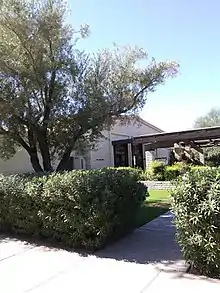
St. Barnabas is one of the Arizona centers for Contemplative Outreach, for those interested in the practice of Centering Prayer as taught by Father Thomas Keating.[26]
Outside organizations are also allowed to use the church's facilities, including Alcoholics Anonymous.[27]
St. Barnabas' current Rector, Jim Clark, along with clergy colleagues, parishioners, and biblical scholars, has developed a specific type of small group Bible study, called "The Art of Engaging Holy Scripture" (TAEHS). The practice is meant to create "... a lively method of engaging the Scriptures through reading and study, conversational prayer and silent prayer, and group sharing." The practice gives the participants a succinct Biblical and Ecclesiological framework to enhance their prayer life and bible study, both in group sessions and on their own.[28]
The church also has its own chapter of the Order of Saint Luke.[29]
Current campus
Since the construction of the original sanctuary, chapel and education building, the campus has grown over the decades. Office space was built in between the sanctuary and chapel in 1961 as part of the original plan, and was expanded in 1984, and a state of the art music building was constructed across the courtyard from the sanctuary.[30] The sanctuary's original design contains rhythmic columns and arches, a high ceiling and a raised circular altar.[9] The church's carillon is housed in the building. North of the music building is another structure holding a bookstore and coffee shop. Hutton Hall (constructed 1964) lies still further to the north, which also contains the parish's kitchen. To the north of the sanctuary lie the Memorial Garden, with a Labyrinth just to its east. The most northerly buildings include the original education structure, which has now been joined by two more education/meeting buildings, which also house the parish's library. The rest of the campus contains gardens, walkways, parking lots and a children's playground.[30] Covered walkways connect the various structures. The main sanctuary incorporates indirect lighting sources which "provide a visual depth to the contemplative space."[31]
The campus contains several pieces of art. Until its removal to a climate controlled facility, a tapestry by Lee Porzio and Allen Ditson's, "Ode to Joy," hung behind the altar. Hanging behind its counterpart in the chapel is a 15th-century oil painting by Francesco Zaganelli.[9] Ditson created the main altar, based on the concept of the crown of thorns as the support for a ship, symbolizing the church. However, that design was not accepted by the church's fine arts committee, and so was modified to its current form. The current base is made of triangular pieces of flamed steel, symbolizing mind, heart, and spirit, the three aspects of mind. Man's constant striving to reach ever upward is symbolized by the stand's pyramid shape. Other items designed by either Porzio or Ditson include the main sanctuary cross, candelabras, the door to the chapel, and alms basins.[32][33]
Notable parishioners/clergy
- Sandra Day O'Connor – first woman Justice on the U.S. Supreme Court
- John Pritzlaff – Member of the Arizona House of Representatives, and the Arizona State Senate[34]
- Fife Symington – Former Governor of Arizona, and his wife, Ann Pritzlaff Symington, deacon
- John S. Thornton – Episcopal Bishop
References
- "Barnabas Soon To Be A Parish". The Arizona Republic. November 5, 1955. p. 16. Retrieved June 30, 2019 – via Newspapers.com.

- "The Episcopal Parish of Saint Barnabas on the Desert". Churchtoyou.org. Archived from the original on December 11, 2016. Retrieved December 11, 2016.
- "St. Barnabas Church Rites To Be Tuesday". The Arizona Republic. October 2, 1954. p. 12. Retrieved June 30, 2019 – via Newspapers.com.

- "'Desert' Church To Be Dedicated". The Arizona Republic. October 3, 1954. p. 7. Retrieved June 30, 2019 – via Newspapers.com.

- The Living Church. 130. February 6, 1955. p. xxvii. Retrieved December 11, 2016.
- "Architect's Sketch Accepted By St. Barnabas Congregation". The Arizona Republic. September 3, 1960. p. 44. Retrieved June 30, 2019 – via Newspapers.com.

- "Farewell Dinner Honors Minister in San Rafael". Daily Independent Journal (San Rafael, California). September 24, 1959. p. 4. Retrieved February 27, 2016 – via Newspapers.com.

- "St. Barnabas Church To Be Outstanding". The Arizona Republic. December 11, 1960. p. 135. Retrieved June 30, 2019 – via Newspapers.com.

- Tsegi, Mike (July 11, 2010). "St Barnabas on the Desert – Scottsdale, Arizona". Waymark. Archived from the original on December 11, 2016. Retrieved February 27, 2016.
- "Tannoy improves intelligibility at St Barnabas on the Desert". Pro Audio-Central.com. November 12, 2012. Archived from the original on December 11, 2016. Retrieved September 14, 2015.
- Jim Newton (December 26, 1970). "Fine Art Is Brought Back". Phoenix Gazette.
- "A Reflection". Mockingbird Messenger. 8 (2). February 1999.
- "St. John's Organ Dedication Set". Daily Independent Journal (San Rafael, California). September 24, 1959. p. 4. Retrieved February 27, 2016 – via Newspapers.com.

- "Consecration Ceremony Set For St. Barnabas". Scottsdale Daily Progress. April 28, 1973. p. 5.
- "Rector Named at Scottsdale". Tucson Daily Citizen. September 26, 1970. p. 4. Retrieved February 27, 2016 – via Newspapers.com.

- McElfresh, Pat (December 7, 1974). "Husband-Wife Team Has Created New Art Form For Church Doors". Scottsdale Daily Progress.
- Kathy Leffler (July 6, 1993). "Creative Genius Thrives in the TPV Studio of Ditson and Porzio". Town of Paradise Valley Independent. p. 8.
- "World Carillon Federation - World List of Carillons". World Carillon Federation. Retrieved May 4, 2018.
- "Directory of Carillons, 2014" (PDF). The Guild of Carillonneurs in North America. Retrieved May 4, 2018.
- "St. Barnabas on the Desert Episcopal Church Master Plan, Music Building, and Campus Improvements". Knoell & Quidort Architects. Archived from the original on December 11, 2016. Retrieved February 27, 2016.
- "St. Barnabas on the Desert Episcopal Church" (PDF). Knoell & Quidort Architects. Archived from the original (PDF) on December 11, 2016. Retrieved February 27, 2016.
- Griffiths, Lawn (October 21, 2006). "A brief history of carillon bells in Arizona". East Valley Tribune. Archived from the original on February 28, 2016. Retrieved February 27, 2016.
- "St Barnabas on the Desert Episcopal Church Carillon". Waymarking.com. Retrieved July 29, 2017.
- Balazs, Diane (October 18, 2010). "St. Barnabas unveils sanctuary renovation". Arizona Republic. Retrieved September 14, 2015.
- "Portfolio". Sarah Hall. Retrieved February 27, 2016.
- "Contemplative Outreach of Phoenix". Contemplative Outreach. Retrieved February 27, 2016.
- "Alcoholics Anonymous (A. A.) Meetings in Paradise Valley, Arizona". Alcoholics Anonymous. Retrieved February 27, 2016.
- "The ART of Engaging Holy Scripture (TAEHS)". St. Luke's on The Lake Episcopal Church. Retrieved February 27, 2016.
- "Scottsdale – St. Barnabas on the Desert Chapter". Order of St. Luke. Retrieved July 30, 2017.
- "Our Campus". Saint Barnabas on the Desert. Archived from the original on December 11, 2016. Retrieved December 11, 2016.
- Sydnor, Dougleas B. (2013). Paradise Valley Architecture. Arcadia Publishing. p. 68. ISBN 0738596590.
- "Creative Genius Thrives in the TPV Studio of Ditson and Porzio". Town of Paradise Valley Independent. July 6, 1993. p. 8.
- St. Barnabas on the Desert. The Episcopal Parish of Saint Barnabas on the Desert. 1992. p. 6.
- Mary Rabideau Silvers (May 10, 2005). "Milwaukee's Pritzlaff Made Name in Arizona". Milwaukee Journal Sentinel. p. 6B. Retrieved February 27, 2016.